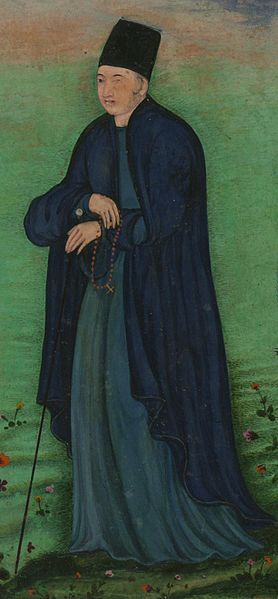
This English fulano was the picaresque and obscure John Mildenhall, a merchant who had been previously involved in the Levant trade. Around 1600, he was contemplating the possibility of travelling to Cairo from Aleppo, but he rapidly changed his plans and decided to travel to Lahore, probably influenced by news of the formation of the East India Company (EIC). Mildenhall’s sudden decision to travel to Lahore suggests that he sought to establish contacts with the Mughal authorities in the hope of obtaining a reward for his good services. Indeed, some years later after returning to England, Mildenhall petitioned the East India Company, the English crown and wrote a long letter on his exploits in India addressed to Richard Staper, a prominent and well-connected London merchant who was behind the foundation of the Levant Company and the East India Company.[3]
Mildenhall’s days at the Mughal court were not only one of the primordial moments of the English presence in India, but also an important and neglected episode of the complex triangular interactions between the Portuguese (represented by the Jesuits), the English and the Great Mughal. Although he was not an official emissary from Elizabeth I, Mildenhall’s impromptu attempts to obtain commercial privileges from Emperor Akbar paved the way to a series of intense diplomatic and commercial exchanges between England and Mughal India.
However, Mildenhall remains a somehow ignored figure in the grand narrative of the English presence in India. One reason for this neglect resides in his failure to persuade the EIC or the English Crown to support him. Indeed, by the time that Mildenhall returned to London, the EIC had launched its third voyage to the Seas of India in which William Hawkins was assigned to present a letter from James I to Jahangir. Besides the bad timing of Mildenhall’s petitions, his letter to Richard Staper draws upon a careful narrative of his exploits which, apart from his direct exchanges with Akbar and clashes with the Jesuits, is rather laconic about his interactions with other elements of Mughal society and politics. More concerned in self-promotion than in providing a careful description of the Mughal court, Mildenhall and his letter became a sort of passing reference in the history of Anglo-Mughal relations and cross-cultural interactions.
Yet Xavier’s report on the exploits of the English fulano at the Mughal court encourages a reappreciation of John Mildenhall’s time there. Throughout his letter, the Jesuit missionary complaints about Mildenhall’s surprising ability to manoeuvre within Mughal courtly circles by establishing friendships with relevant courtiers, an indication of the success of the English fulano in not only engaging with local actors according to their own forms of social interactions, but also of his capacity of adaptation to local commercial and political interests.[4] Mildenhall is also castigated for his disruptive impact in the Christian community. According to Xavier, the fulano enticed one Portuguese resident to spread rumours about the deviant behaviour of Jesuit missionaries towards women.[5] This episode reveals that Mildenhall had been for some time fully integrated into the small but heterogenous Christian community of Agra, a group formed by members of the Armenian, Georgian and Greek Orthodox churches, besides a handful of Catholics of Portuguese, Venetian, Florentine, German and French origin, all of them under the de facto leadership of the Jesuit missionaries. The image of Mildenhall emerging from Xavier’s letter is that of an English agent who, despite his failure to obtain a palpable outcome from Akbar, persuaded the Mughal authorities to consider England as a potential commercial and diplomatic partner.
The juxtaposition of the letters written by Mildenhall and Xavier is a good example of the importance of comparing English sources with a wide range of similar documents written in other languages scattered across European, Asian or African archives. Such comparisons not only offer the possibility to reassess historical narratives or events, but also to put together a more complete (or complex) picture of the ways in which transcultural agents formed their strategies and acted accordingly.
João Vicente Melo
- 1. ‘Doc. 2, Letter from Jerónimo Xavier to the Jesuit Provincial in Goa, 6 September 1604’ in Documentação Ultramarina Portuguesa, vol. III ed. António da Silva Rego (Lisbon: Centro de Estudos Históricos Ultramarinos, 1963), p. 15.
- 2. Ibid., p. 15
- 3. Committee to confer with John Midnall concerning his demands and project for going to “Mawgoule” in the East Indies, 30 May 1609’ in Calendar of State Papers Colonial: East Indies, China and Japan, vol. 2, 1513-1616 ed. W. Noel Sainsbury (London, 1862) , p. 185; ‘Petition of John Midnall to the King, 27 July 1609’ in Calendar of State Papers Colonial: East Indies, China and Japan, vol. 2, 1513-1616 ed. W. Noel Sainsbury, p. 190; ‘John Mildenhall, 1599-1606’ in Early Travels in India ed. William Foster (London: Oxford University Press, 1921), pp. 52-59.
- 4. ‘Doc. 2, Letter from Jerónimo Xavier to the Jesuit Provincial in Goa, 6 September 1604’ in Documentação Ultramarina Portuguesa, vol. III ed. António da Silva Rego (Lisbon: Centro de Estudos Históricos Ultramarinos, 1963), p. 20.
- 5. Ibid., p. 16.






